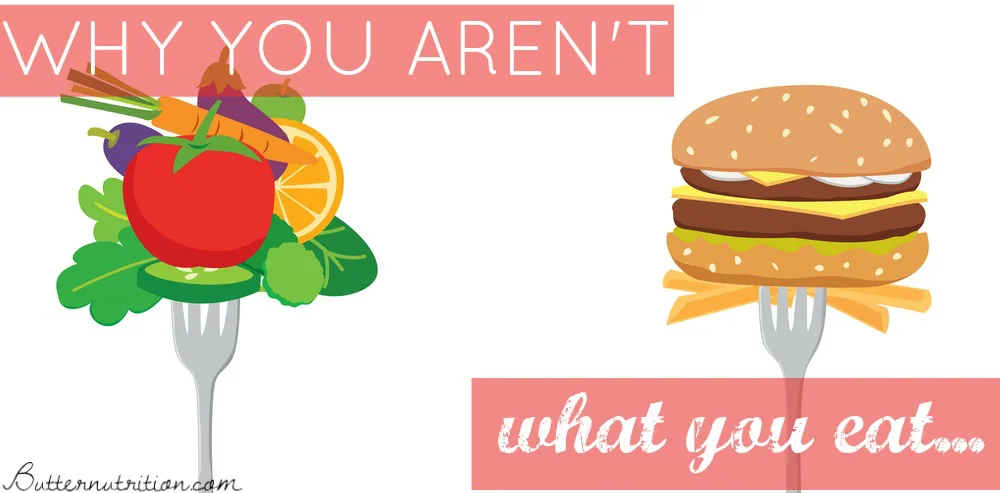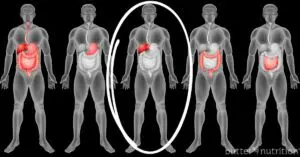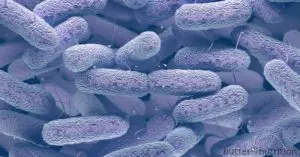Contrary to popular belief, you aren't what you eat...
Wait, what??
If you eat a so-called perfect dietary trifecta of kale, nuts and quinoa with hopes of becoming a green goddess, good luck.
Just because you eat these healthy foods, it does not mean that you are as healthy as the nutrient-profile packed deep inside kale and quinoa! Chances are your nutrition is in far, far worse shape than you think.
Truth be told this very principle screws up a ton of people, and it actually sends their heath into the opposite direction -- the gutter.
Why I'm talking to YOU
If you're reading this blog, you probably have the desire to eat healthier.
Your motivation might come from having poor health, being overweight, or from experiencing a devastating health crisis either yourself or of someone close to you. Under any of these circumstances, your digestive health and metabolism usually suffer to some degree, which decreases the amount of energy that your body designates to digesting your food.
In reality, this means less hydrochloric acid in the stomach to efficiently break down your food, less digestive enzymes in the small intestines to break down carbohydrates, less bile (or sluggish bile) to emulsify your fats for absorption and to keep your microbiome in tip top shape.
Without proper digestion, you can't have good health, no matter what you are eating.
Why is that? Because if your digestion is inadequate — so is your nutrition, and the integrity of each cell, tissue, and organ in your body will suffer.
Eating all the nuts, seeds, quinoa, and kale in the world will not fix you and your nutritional debt; it might actually make things much worse!
Let me illustrate exactly why...
You aren't what you eat. You're what your body is capable of digesting and detoxifying
Imagine for a minute you have an infant son. He's 9 months old and discovering the wonderful world of real food. Would you feed him raw kale, nuts/seeds, flax, and quinoa?
If you have ever been a parent or have watched young children the answer is -- probably not. Because you know how that diaper would turn out. These foods are just far too difficult for small children (and many adults for that matter) to digest. It's a much better choice to feed your infant son nutrient dense foods that is highly digestible and low in plant toxins. Not difficult to break down like...
- Ripened fruit
- Cooked and/or puréed tubers
- Cooked and/or puréed squashes
- Cooked and/or puréed root vegetables
- Traditional fats (such as butter, eggs, animal fats)
- Breast milk
- Clean cheeses, yogurt, and other dairy products (if tolerated and not getting vitamin A excess)
- Easy to digest proteins - eggs, fish, dairy products (if tolerated), and muscle meats
- Sourdough bread, whole grains and legumes (if tolerated)
This list should not just be for small children. Indeed, most people should be eating highly digestible and nutrient-dense food 90% of the time.
Why? Digestion weakens due to age, nutritional deficiencies and chronic stress (this pretty much includes everyone). Additionally, the US Department of Health and Human Services estimates that 60 to 70 million Americans are affected by a digestive disease! That is a pretty big number and it does not take into account all of those who are suffering with the all-too-common symptoms of gas, bloating, constipation and/or diarrhea on the regular that they attribute as normal digestion.
Logical approach to eating
What kind of foods are counterproductive to digestion? This highly depends on the person and their digestive environment, but there are a few categories that deserve special attention in today's world. Just because you can put a food in your mouth does not mean you were intended to eat it or that it is going to support good health.
Example #1: Nuts/seeds
Foods like nuts and seeds are very hard to break down and that makes it difficult to reap the nutrition inside them. This is why nuts are commonly found undigested in your stool.
Nuts are also high in polyunsaturated fats, which can inhibit digestion at high dosages (exactly the opposite of what you want to do)!
Some nuts, like almonds are high in dietary oxalates, which can become problematic when eaten in excess.
Solution: use nuts/seeds occasionally or as a garnish. Not as a mainstay of your diet. Eating nuts in excess can contribute to zinc:copper imbalances (copper toxicity), oxalate overload, and impair digestion.
Example #2: Kale, chard and spinach (and other raw greens)
Raw leafy greens are incredibly problematic, especially when your digestion is fragile. Salads and raw leafy greens are increasingly popular for their health touted benefits but were you really meant to eat them?
While cows eat grass, their stomach also has four compartments (rumen, reticulum, omasum and abomasum) to support such digestion. This is the same with other ruminant animals, like sheep and goats that allows them to eat very tough plant matter.
Humans on the other hand do not have such digestive support. Cellulose, the primary carbohydrate in plants where in which the nutrients are locked away, is incredibly hard to break down in the human digestive system. With that in mind—is it really working for your body? Your body should not have to work hard to get nutrients from your food. If it does, you're doing your body a huge disservice.
Furthermore, spinach and their other dark leafy counterparts could be subject to toxicity due to the high amount of dietary oxalates they contain (think pain and kidney stone risk).
Solution: choose lightly colored greens, juice your greens or cook them a majority of the time (cooking breaks down the indigestible cell wall), and eat them in moderation. Also supplement carefully.
Anytime you eat food that exceeds your body’s ability to digest, those foods end up working against you. Most people have enough working against them in life - not enough sleep, stress, and crazy schedules. Food should not be one of them.
Takeaway
If you gleaned anything valuable from this article, it should be to pay attention and listen to your body. If you're seeing undigested foods in your stool (or digestive reactions of any kind), it's a clear sign that your body is having a hard time breaking it down correctly. If you're not digesting it properly, then you're not getting the nutrition, and there are much better things you should be eating to take your nutrition to the next level.
Gut testing to assess your microbiome and Hair Analysis are great tools to learn about your body and what it needs to support optimal digestion.
Knowledge on your own body is power!
Are you what you eat or not so much? Please share in the comments!
PIN IT:
References:
Photo Credit: Depositphotos.com/kaisorn4
http://digestive.niddk.nih.gov/statistics/statistics.aspx







rgbjb
Great article!
jonelle
Yes! great article. I like to enjoy a green smoothie for breakfast, but realised raw greens are not ok. So I cook my greens (like kale), with sweet potato in bulk, blend them , then freeze them in icecube trays. I pop a couple into my smoothie every morning..
Kim
Wonderful idea! Thanks for sharing this. 🙂
Tanya
What about blending the baby varieties of these greens in smoothies, such as baby kale and baby spinach. Can our bodies break that down efficiently? And what about soaking and dehydrating nuts - are nuts ok then to eat regularly? Thanks for this article!
Bouncedancer
Hi Tanya, it's been a while since you posted this, but I have an answer for you. Many people are not aware that this yummy food can be really hard on the digestive system. They almost did me in till I figured it out -- for some, it's the fiber, for others it's the lectins that may cause reactions. Lectins are a huge subject, but, speaking for myself, I discovered that nuts were incredibly inflammatory to my lower bowels. I tolerate seeds OK, but I do much better with animal protein/eggs and produce (white-flour bread products are my daily treat foods, because I don't react to those, whereas I react severely to whole wheat -- it's the fiber again. Soaking/sprouting does not fix this.
Michelle
Hi, so basically salad which is taught to be healthy is not healthy now? And it doesn't make sense if food isn't all the way digested that doesn't mean it's not healthy for you? Sugar is digested all the way, as is junk food.. but they are not healthy for you. This article confused me..
Maddy
The article isn't saying that the contents of raw greens, seeds, etc. are unhealthy, it's saying that those foods are difficult to digest, which is bad for your body for two main reasons: A) you're not actually supplying your body with nutrients and B) you're making your body expend more energy in digestion than it should be. That's probably why people on diets are sometimes hungry and tired, because they're not doing it right. When healthy raw foods that are hard to digest are blended for smoothies or cooked, it allows the body to better absorb the nutrients than if they were eaten raw. Although I've heard that raw diets are best because cooking veggies breaks down some nutrients? Which is why smoothies are really good for you, especially ones with raw greens.
MF4Mark
Michelle, basically if you have any symptoms of leaky gut: overweight, autoimmune conditions, psychological issues, general malaise then you need to be more selective. Like reducing lectins, and cooking most of the healthy plants and/or using digestive enzymes to help. Undigested means fermentable which if your gut microbiome isn't in good balance, could mean big trouble.
Anna
Thank you for this article, it really enlights mea, I have been eating kale "superstar" several months, I didn't know why I've felt stomach disconfort, same thing with spinaches, I'm going to cook them from now on, and I'll be confident that they will keep their properties
Lawrence
Very impressed with the title 🙂 But when I read the post, I can that I did not waste 5 mins 🙂 Thank you for a very detailed article!
Alicia
While this article mentions some things that are based on science, it is way over simplified, even for a lay reader, and this is exactly what is wrong with the nutrition blogs that surface these days. Here are a few of my problems with your claims:
1. Flax, quinoa, and nuts/seeds aren't that great for you because they're hard to digest? True, they can be harder to digest, but if you grind flax for example, the nutrients are much more available to your body and they provide omega 3 fatty acids, which are essential to the diet, have a number of health benefits, and are pretty hard to find in foods other than nuts and seeds (aside from fish really). Nuts are also a great protein alternative to meat, which is not only relatively unsustainable for the environment, but if you aren't choosing healthier, leaner meats, you're increasing your risk of some forms of cancer.
2. The harder it is to digest, the worse it is for you? This one I didn't follow at all. You need dietary fibre. Things like cellulose are good for you in normal doses because the indigestible fibres harden your stool, making your intestinal muscles work less to clear the waste produced from your food. That doesn't mean go crazy and eat a full head of celery every day, but the advice to minimize these foods in our diet is too far fetched. The only time they're bad for you really is in high amounts because they pull water which can dehydrate you, and high amounts can constipate you. Dark leafy greens like kale are also good for you because they are high in many vitamins and minerals, including folate (an essential for women of childbearing age! Not enough folate can result in spina bifida in the fetus -a neural tube defect). Cooking some vegetables can also destroy some of the nutrients or leech them out, so you really need to watch your cooking methods and may need to eat even more to get the same nutrient value that would come from a raw fruit or vegetable.
As a second point to that, simple sugars/carbs (usually the added sugars - sucrose, fructose) are much easier to digest than complex carbs, but aren't as good for you because the body can break them down so rapidly you end up with insulin spikes. Complex carbs like whole grains and pasta are much better for your body's regulation of insulin and glucagon BECAUSE they are harder to break down and remain in digestion longer so the sugar can enter your bloodstream at a slower rate.
The key to all of this is moderation, and there is no secret or superfood that will make you healthy, or a magic pill to boost digestion. Eating a diet that balances all the food groups and getting at least a moderate amount of physical activity each day is the best medicine for healthy weight loss that stays off.
All in all, I like the takeaway message and the underlying messages in this article are good, but I think to simplify it to limiting certain foods or changing preparation methods without explaining the benefits these foods or the downfall of other preparation methods is too simplified to actually inform readers.
(Also, it seems your reference has been deleted...)
Maddy
great critique
Gina
This article is not saying that flax, greens and nuts are bad for you it's is simply saying if your digestion isn't optimal the food that we think are good for us are not. This is correct information.
Bouncedancer
Alicia, This is what I tell my clients too: If they have digestive issues, they need to look at the foods they eat, and the troublesome food may be what people assume is a super healthy food. For example, I don't tolerate ANY whole wheat, nuts or oats -- they KILL my lower intestine. (White flour -- no problem!) These are very typical food sensitivities; I have had many people thank me for pointing out this possible connection.
The fiber in whole wheat can be a problem because it is shard-like and can greatly irritate the intestines. Nuts have lectins that can be very problematic for many. Raw kale or other raw brassicas are not so good to eat in large amounts for people with thyroid issues, and all that uncooked fiber can cause problems for people.
Maartje
The point is that very sensitive people don't tolerate the fibre. See the principles of the gaps diet. It's not supposed to be forever. If you heal your gut you can introduce the raw veggies and seeds and nuts etc because raw veggies can have great benefits
Ioan
We are not what we eat! We are what we absorb!: https://www.youtube.com/watch?v=wb8A7MsWdbY .
http://foodmatters.tv/articles-1/the-benefits-of-soaking-nuts-and-seeds .
http://www.westonaprice.org/health-topics/abcs-of-nutrition/characteristics-of-traditional-diets/ .
Laury Coultas
I eat real food. I like to eat. Smoothies are not my thing. I do not have digestive issues after I stopped eating processed food. What I don't eat enough of, I supplement. Such as, fish oil, magnesium, B Complex with Biotin ,and a good probiotic. Eating real food allowed me to eradicate fatty liver disease and reverse my type 2 diabetes by losing 60 pounds. Water is THE magic, weight-loss elixir!
Bahaa
Wondetful article
Best luck
Nunya Beeswax
You are correct with at least one thing in this article: you are not what you eat. BUT - you get out what you put in! PERIOD
Jennifer Solomon
Actually, soaking nuts and seeds properly as well as sproating grains. And cooking or massaging kale and always eating it with some fat and citrus is the way to go!
You are right about the whole, most natural sources of raw dairy and butter and eggs. And not much muscle meat- more organ meats from grass pastured animals.
Anna Wright
WOW! Awesome tips and ideas. Thank you for sharing this valuable information. Catherine it is very distinctive and well written.
Erika
Important things to remember:
1. We lose stomach acid as we get older so we don't break down food as well especially when it comes to the chemical conversion of nutrients into collagen and is one of many reasons (low potassium) why we have saggy skin when we get older and anything the stomach cannot digest it turns it to fat ibid. and even more so when all the foods you are eating are loaded preservatives without supplementing low stomach acids ( i.e. alkaline stomach; acid reflux, gerd, heartburn etc) with betaine HCL w/peptides (always eat protein with it), amylase, bromelain, lipase, apple cider vinegar mixed with lemon juice...
2. Taking vitamin supplements (you might as well drink a glass of rocks) in pill form are like trying to stuff the empire state building into your cells compared to golf ball sized molecules of trace minerals and vitamins in raw organic vegetables and fruits.
Rene
This was so beneficial for me. This is exactly how I eat; raw veggies, especially salads, nuts and dried fruit, kale, quinoa... and I struggle with my digestion. I honestly thought I was the healthiest person out, and couldn't figure out why my body was struggling to go. Guess I need to make a few changes. Now I know where I was going wrong. THANK YOU
Sarah
Hmmm. I eat a lot of kale, quinoa and nuts. Either I have a digestive system of steel or else this isn't exactly spot on. I never fiND undigested for in my poop and/or have digestive issues. I do blend and cook them at times and I definitely eat a variety, but I find if hard to believe that this is true for people with healthy digestive systems.
Isabel
When you say Juice your greens, do you mean in a juicer or blender. Big difference.
Maartje
The point is that very sensitive people don't tolerate the fibre. See the principles of the gaps diet. It's not supposed to be forever. If you heal your gut you can introduce the raw veggies and seeds and nuts etc because raw veggies can have great benefits
Anna
Thank you Catherine, I know I have a problem to digest certain foods like greens, I wasn’t sure if these greens kept their properties once cooked, it’s great to know it’s not imperative to eat them raw
Bill
Says article will be continued after the advertisement didn't see an advertisement or any more article you've got an ebook for sale would not buy it because I have never successfully been able to download an e-book where I could read it anyway you have a very convincing ad it just doesn't tell you anything
MF4Mark
Since our food is pasteurized, it lacks critical enzymes and probiotics. Wouldn't it help your body digest these "rougher" foods by supplementation? In other words, why not help the body out by taking proteolytic enzymes and probiotics on an empty stomach (at different times of the day of course) and digestive enzymes with meals?
Robyn Kardos
how do you recommend balancing the minerals after a HTMA? with supplements or food?
Catherine
Hi Robyn,
Typically my plans are 90% food and 5-10% food based supplements. Sometimes we use a synthetic supplement if we have to, but it's usually a last resort and for a short period of time.
Abundantly,
Catherine
MF4Mark
Catherine,
I'm new to the whole lectin thing and I think it was fairy obscure when you originally wrote this article. Nowadays it's considered controversial but getting more attention. FWIW, the idea of the earth revolving around the sun was once also considered controversial by the vested interests. I think you should write an article or 2, maybe even interview Dr Gundry. I think it would be way cool if you did. The big names Mercola and Axe are too busy taking on the powers that be (google is censoring them from searches).